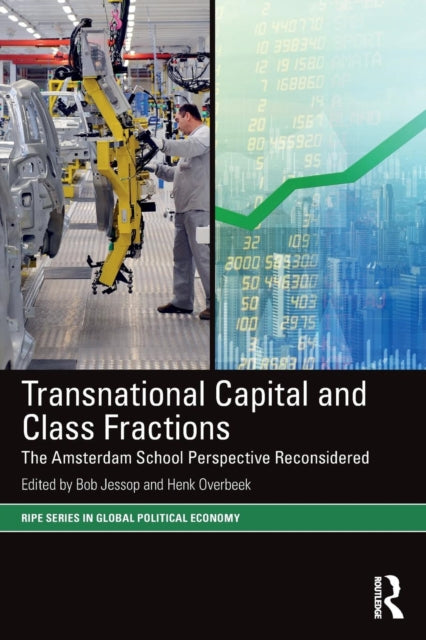Shulph Ink
Transnational Capital and Class Fractions: The Amsterdam School Perspective Reconsidered
Transnational Capital and Class Fractions: The Amsterdam School Perspective Reconsidered
YOU SAVE £1.92
- Condition: Brand new
- UK Delivery times: Usually arrives within 2 - 3 working days
- UK Shipping: Fee starts at £2.39. Subject to product weight & dimension
Bulk ordering. Want 15 or more copies? Get a personalised quote and bigger discounts. Learn more about bulk orders.
Couldn't load pickup availability
- More about Transnational Capital and Class Fractions: The Amsterdam School Perspective Reconsidered
The Amsterdam Schools (AS) introduced the Marxian concept of capital fractions into the study of international politics, contending that politics in advanced capitalist countries takes place in a transnationalized space structured by competing comprehensive concepts of control. This book provides an overview of the Schools' contemporary significance, offering critical commentaries and a self-critical evaluation of their framework in the study of contemporary capitalism. It is written for scholars and students in international political economy, international relations, political science, political sociology, European studies, and academic economics.
Format: Paperback / softback
Length: 300 pages
Publication date: 23 August 2018
Publisher: Taylor & Francis Inc
Emerging in the late 1970s, the Amsterdam Schools (AS) made a significant contribution to international political economy by integrating the Marxian concept of capital fractions into the study of international politics. The AS argued that politics in advanced capitalist countries occurs in a fundamentally transnationalized space where the boundaries between 'domestic' and 'international' have become blurred. This book provides a comprehensive overview of the origins, development, and significance of this distinct approach. It offers a valuable introduction to the Schools for critical scholars, allowing them to gain firsthand knowledge of the contributions that have shaped the work of the AS. The contributions include critical commentaries that discuss the merits and shortcomings of the AS from various perspectives and undertake a self-critical evaluation of the current place and value of the AS framework within the broader landscape of approaches to studying contemporary capitalism. Written for scholars and students alike, this book will appeal to those working in international political economy, international relations, political science, political sociology, European studies, and branches of academic economics such as regulation theory and institutional economics.
Introduction:
The Amsterdam Schools (AS) emerged in the late 1970s as a distinct approach to international political economy. Their most notable contribution was the systematic incorporation of the Marxian concept of capital fractions into the study of international politics. The AS argued that politics in advanced capitalist countries takes place in a fundamentally transnationalized space, where the distinction between 'domestic' and 'international' has blurred. This approach challenged traditional understandings of international relations and provided a new framework for analyzing power dynamics and governance in the global arena.
Development of the Amsterdam Schools:
The AS originated from a group of scholars who were dissatisfied with the dominant approaches to international political economy at the time. They sought to integrate Marxian analysis into the study of international politics, recognizing the importance of capital and labor in shaping economic and political outcomes. The AS developed a comprehensive framework that analyzed the structure of power, the distribution of resources, and the dynamics of capitalist accumulation. They emphasized the role of transnational corporations, financial institutions, and international organizations in shaping global politics and the distribution of wealth.
Significance of the Amsterdam Schools:
The significance of the Amsterdam Schools lies in their ability to provide a fresh perspective on international political economy. They challenged the notion that politics in advanced capitalist countries takes place in a separate realm, separate from the economic and social structures that shape it. Instead, they argued that politics is deeply intertwined with these structures and is shaped by competing comprehensive concepts of control. The AS framework emphasized the importance of power relations, social movements.
The contributions presented in this book provide critical commentaries on the merits and shortcomings of the AS framework. They discuss the strengths of the approach, such as its ability to analyze the complex dynamics of power and governance in the global arena, and its emphasis on the role. They also address the limitations of the approach, such as its neglect of the role of state actors.
In conclusion, the Amsterdam Schools made a significant contribution to international political economy by integrating the Marxian concept of capital fractions. This approach provided a new framework for analyzing power dynamics and governance in the global arena. The contributions presented in this book provide critical commentaries on the merits and shortcomings of the AS framework, discussing the strengths and limitations of the approach and its relevance for understanding contemporary capitalism. This book will be of interest to scholars and students alike in international political economy, international relations, political science, political sociology, European studies, and branches of academic economics such as regulation theory and institutional economics.
Weight: 518g
Dimension: 156 x 233 x 18 (mm)
ISBN-13: 9780815369608
This item can be found in:
UK and International shipping information
UK and International shipping information
UK Delivery and returns information:
- Delivery within 2 - 3 days when ordering in the UK.
- Shipping fee for UK customers from £2.39. Fully tracked shipping service available.
- Returns policy: Return within 30 days of receipt for full refund.
International deliveries:
Shulph Ink now ships to Australia, Belgium, Canada, France, Germany, Ireland, Italy, India, Luxembourg Saudi Arabia, Singapore, Spain, Netherlands, New Zealand, United Arab Emirates, United States of America.
- Delivery times: within 5 - 10 days for international orders.
- Shipping fee: charges vary for overseas orders. Only tracked services are available for most international orders. Some countries have untracked shipping options.
- Customs charges: If ordering to addresses outside the United Kingdom, you may or may not incur additional customs and duties fees during local delivery.


